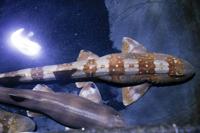With arrival of TV's Shark Week, unique bull sharks remain Oklahoma Aquarium's star attraction - Tulsa World
With arrival of TV's Shark Week, unique bull sharks remain Oklahoma Aquarium's star attraction - Tulsa World |
| Posted: 09 Aug 2020 08:22 AM PDT Mike Tyson, Will Smith, Shaquille O'Neal, Snoop Dogg and, of course, sharks will be the stars of Discovery's Shark Week, an annual "fin-credible" event returning to television sets Aug. 9-16. Shark Week programming usually spurs interest in the Oklahoma Aquarium, where the stars are bull sharks. The Jenks attraction is home to the world's largest collection of bull sharks. Sharks are special creatures (people seem to be fascinated by them), and bull sharks are special in the shark world, explained Kenny Alexopoulos, chief operating officer of the Oklahoma Aquarium. "That's one of the reasons we picked them," he said. "There are a lot of difficulties in captivity with bull sharks, so we are really the only aquarium in the Western Hemisphere that has them. There are only a couple of other aquariums in the world that do, but nobody has as many as we do." Let's dip a figurative toe in the water and delve into what makes bull sharks (more testosterone than any shark) so special. Bite forceAlexopoulos said bull sharks have the strongest bite force among all sharks in relation to body weight. He said a bull shark's bite force is double the bite force of a lion. "Then you couple that with very sharp teeth — literally razor-sharp teeth," Alexopoulos said. "The reason for such a capacity to bite is if they are biting into a large fish or another shark or something like that, they can go through it and bite chunks off, quite large chunks, and swallow them fairly efficiently. If they are attacking sea turtles and that sort of thing, they can get through the shell." Perpetual motionOther types of sharks at the aquarium chill out to conserve energy. Bull sharks are always swimming. "Those animals, in nature, travel hundreds if not thousands of miles searching for food," Alexopoulos said. "They are an apex predator, and they are looking for large fish, sea turtles, things like that, or large dead animals that they can eat, even whales or whatever. That kind of food is hard to find." So it's part of a bull shark's identity to engage in constant forward movement. The bull shark tank at the aquarium was built accordingly. "They don't have too many things in their way or rocks or corals and things like that because they really don't utilize that in nature, and it actually gets in their way and can be a hazard for them," Alexopoulos said. "If they spook or whatever and they are swimming fast, they could hit something. Basically, they are almost robotic in how they exist. They just are continuously swimming and using their sense of smell to drive them to different areas where food may be and that kind of thing." Because bull sharks are engineered to patrol for snacks, you might assume every day is an all-you-can-eat buffet. But that would be an incorrect assumption. "They are not used to getting food every single day," Alexopoulos said. "As a matter of fact, it is bad for them." Alexopoulos said bull sharks don't store fat like other animals, or even fish. They store fat only in the liver. "If a bull shark eats too much, their liver swells and it eventually fails on them," he said. "In the wild, they may not eat but once a week or twice a week. We feed the bull sharks twice a week, and we monitor how much food each shark gets and we put vitamins in their food." Meanwhile, zebra sharks at the aquarium have a faster metabolism and are treated to daily feedings in controlled amounts, according to Alexopoulous. AdaptabilityFresh water? Salt water? It makes no difference. Bull sharks are good to go because they are gifted with the ability to adapt. They are among few sharks that can do that, according to Alexopoulos, who said there are two reasons for this. One of those reasons is it expands the food search territory. The other reason is linked to continuation of the species. "Bull sharks are pretty smart in their strategy of reproduction," he said. Bull sharks give live birth. Sharks love to eat other sharks, so baby sharks have a tough time surviving the first couple of years. Pregnant bull sharks protect their young by venturing from the ocean into fresh water areas. "Their biology tells them to stop eating, so they are not hungry," Alexopoulos said. "They won't eat when they are in there, so they are not going to eat anybody else's pups. And those pups stay in that fresh water environment, usually marshes or estuaries or even mangrove areas where food is plentiful because those are nursery grounds for smaller fish. It's a two-fold benefit. Other sharks can't go in there to eat them and, two, there is plenty of food for them to help them grow." As baby sharks grow, they migrate toward the ocean or journey back and forth from fresh water to saltwater areas. Once they reach adulthood, they will generally — but not always — stay in an ocean environment, according to Alexopoulos, who said bull sharks have been found 2,000 miles up the Amazon River. Replacement teethMost sharks — not just bull sharks — lose teeth when they dine, but it's not a problem because reinforcements are on standby. Sharks don't necessarily lose teeth every time they eat, but some sharks can lose 10,000 to 20,000 teeth over the course of a lifetime, according to Alexopoulos. "That's why they have rows and rows of teeth is because they are constantly moving like a conveyor belt," he said, adding that a shark's tooth is about as close to perfection as it gets. "It's really designed for cutting. In order to make it cut like a razor, it has to be thin and delicate, so it will dull fairly quickly or break fairly easily. ... That's why they are constantly adding new ones so they will always have a fresh set of teeth to feed with." Proceed with cautionZebra sharks at the aquarium can be like a puppy dog, according to Alexopoulos, who said they can be petted by divers. When it comes to jumping into a tank with bull sharks, there is an inherent risk for the aquarium's divers, who take precautions by wearing chain mail suits. Myth-bustingAlexopoulos described bull sharks as aggressive. He said they are "brave and daring" when it's time to eat. Here's why you're not going to be dinner: Asked if there were any shark myths he wanted to bust, Alexopoulos said one myth is people think all sharks are dangerous or have the potential to be dangerous, and that's not true (some sharks are downright un-shark-like). Another myth is sharks are so bloodthirsty that, if one is in the vicinity, it will try to attack you. "That's very, very much not the case," Alexopoulos said. "We are just really not on their menu, and we are kind of an odd thing for them to come across. We are typically not what they want to eat." Alexopoulos said only a handful of people, at most, are killed annually by sharks. He said the odds are astronomical of being killed by a shark, and there's a better chance you will, for instance, be struck by lightning. "There are even stats that say you are more likely to be killed by a falling coconut," he said. "I haven't researched that, but that's what I have heard. People have got to realize when they are in the ocean, there are sharks all around them. If they wanted to attack, they would have been attacked by now." Featured video Gallery: Get to know the Oklahoma Aquarium sharks during Shark Week Oklahoma Aquarium sharks A Bull Shark eats chunks of fish at the Oklahoma Aquarium in Jenks on Thursday, Aug. 6, 2020. IAN MAULE/Tulsa World Oklahoma Aquarium sharks A Bull Shark eats chunks of fish at the Oklahoma Aquarium in Jenks on Thursday, Aug. 6, 2020. IAN MAULE/Tulsa World Oklahoma Aquarium sharks A Bull Shark eats chunks of fish at the Oklahoma Aquarium in Jenks on Thursday, Aug. 6, 2020. IAN MAULE/Tulsa World Oklahoma Aquarium sharks A Bull Shark eats chunks of fish at the Oklahoma Aquarium in Jenks on Thursday, Aug. 6, 2020. IAN MAULE/Tulsa World Oklahoma Aquarium sharks Spectators watches as Bull Sharks eat at the Oklahoma Aquarium in Jenks on Thursday, Aug. 6, 2020. IAN MAULE/Tulsa World Oklahoma Aquarium sharks Spectators watches as Bull Sharks eat at the Oklahoma Aquarium in Jenks on Thursday, Aug. 6, 2020. IAN MAULE/Tulsa World Oklahoma Aquarium sharks Spectators watches as Bull Sharks eat at the Oklahoma Aquarium in Jenks on Thursday, Aug. 6, 2020. IAN MAULE/Tulsa World Oklahoma Aquarium sharks Spectators watches as Bull Sharks eat at the Oklahoma Aquarium in Jenks on Thursday, Aug. 6, 2020. IAN MAULE/Tulsa World Oklahoma Aquarium sharks A Bull Shark eats chunks of fish at the Oklahoma Aquarium in Jenks on Thursday, Aug. 6, 2020. IAN MAULE/Tulsa World Oklahoma Aquarium sharks \ Bull Sharks eat at the Oklahoma Aquarium in Jenks on Thursday, Aug. 6, 2020. IAN MAULE/Tulsa World Oklahoma Aquarium sharks A Bull Shark eats chunks of fish at the Oklahoma Aquarium in Jenks on Thursday, Aug. 6, 2020. IAN MAULE/Tulsa World Oklahoma Aquarium sharks Spectators watches as Bull Sharks eat at the Oklahoma Aquarium in Jenks on Thursday, Aug. 6, 2020. IAN MAULE/Tulsa World Oklahoma Aquarium sharks A Bull Shark eats chunks of fish at the Oklahoma Aquarium in Jenks on Thursday, Aug. 6, 2020. IAN MAULE/Tulsa World Oklahoma Aquarium sharks Spectators watches as Bull Sharks eat at the Oklahoma Aquarium in Jenks on Thursday, Aug. 6, 2020. IAN MAULE/Tulsa World Oklahoma Aquarium sharks Spectators watches as Bull Sharks eat at the Oklahoma Aquarium in Jenks on Thursday, Aug. 6, 2020. IAN MAULE/Tulsa World Oklahoma Aquarium sharks Spectators watches as Bull Sharks eat at the Oklahoma Aquarium in Jenks on Thursday, Aug. 6, 2020. IAN MAULE/Tulsa World Oklahoma Aquarium sharks Spectators watches as Bull Sharks eat at the Oklahoma Aquarium in Jenks on Thursday, Aug. 6, 2020. IAN MAULE/Tulsa World Oklahoma Aquarium sharks Spectators watches as Bull Sharks eat at the Oklahoma Aquarium in Jenks on Thursday, Aug. 6, 2020. IAN MAULE/Tulsa World Oklahoma Aquarium sharks Spectators watches as Bull Sharks eat at the Oklahoma Aquarium in Jenks on Thursday, Aug. 6, 2020. IAN MAULE/Tulsa World Oklahoma Aquarium sharks Bull sharks swim in a tank at the Oklahoma Aquarium in Jenks. The aquarium is home to the world's largest collection of bull sharks. IAN MAULE/Tulsa World Oklahoma Aquarium sharks People watch as bull sharks swim in a tank at the Oklahoma Aquarium in Jenks. IAN MAULE/Tulsa World Oklahoma Aquarium sharks Bull Sharks are constantly on the move at the Oklahoma Aquarium. IAN MAULE/Tulsa World Oklahoma Aquarium sharks Bull sharks are a featured attraction at the Oklahoma Aquarium in Jenks. IAN MAULE/Tulsa World Oklahoma Aquarium sharks A zebra shark swims on the bottom of a tank at the Oklahoma Aquarium. Bull sharks are always swimming, but other sharks, like zebra sharks, will conserve energy. IAN MAULE/Tulsa World Oklahoma Aquarium sharks Bull sharks attract the interest of visitors at the Oklahoma Aquarium in Jenks. IAN MAULE/Tulsa World Oklahoma Aquarium sharks A Zebra Shark swims on the bottom of a tank at the Oklahoma Aquarium in Jenks on Wednesday, Aug. 5, 2020. IAN MAULE/Tulsa World Oklahoma Aquarium sharks The Oklahoma Aquarium in Jenks is home to the world's largest collection of bull sharks. IAN MAULE/Tulsa World Oklahoma Aquarium sharks Bull sharks are special creatures and they can be found at the Oklahoma Aquarium in Jenks. IAN MAULE/Tulsa World Oklahoma Aquarium sharks The bite force of a bull sharks is superior to the bite force of any other type of shark. IAN MAULE/Tulsa World Oklahoma Aquarium sharks Visitors can get up close and personal with bull sharks at the Oklahoma Aquarium in Jenks. IAN MAULE/Tulsa World Oklahoma Aquarium sharks A Swell Shark sits in a tank in a tank at the Oklahoma Aquarium in Jenks on Wednesday, Aug. 5, 2020. IAN MAULE/Tulsa World Oklahoma Aquarium sharks It's Shark Week, which might motivate people to check out sharks at the Oklahoma Aquarium. IAN MAULE/Tulsa World Oklahoma Aquarium sharks Bull sharks are headline attractions at the Oklahoma Aquarium in Jenks. IAN MAULE/Tulsa World Oklahoma Aquarium sharks People watch as Bull Sharks swim in a tank at the Oklahoma Aquarium in Jenks on Wednesday, Aug. 5, 2020. IAN MAULE/Tulsa World |
| You are subscribed to email updates from "monster aquarium fish" - Google News. To stop receiving these emails, you may unsubscribe now. | Email delivery powered by Google |
| Google, 1600 Amphitheatre Parkway, Mountain View, CA 94043, United States | |
Comments
Post a Comment